Renaming Noncognitive Skills to Emphasize Success
by Dr. David T. Conley
In January, 2013, I authored a Commentary in Education Week that made a case for renaming "noncognitive" skills. My argument was a sound one, I think, but my suggested replacement, metacognitive learning skills, didn't exactly catch on. So, I'm taking another run at this, largely because I, like many others, have not been satisfied with the alternatives put forth so far.
For example, the term "soft skills" has been in play since the issuance of the SCANS report in the early 1990s as a descriptor for what it takes to be able to succeed in the 21st century workplace. Why these skills are "soft" when employers consistently value them more than measures of content knowledge is beyond me. I assume it's because the way they're measured is "softer" than content-knowledge tests. The fact that they're harder to measure suggests it would make more sense to call them "hard skills," but I won't pursue the term beyond noting this inconsistency.
Another term gaining popularity is social-emotional learning. While I think the concept of validating and valuing the development of social and emotional skills in students makes perfect sense, I have an aversion to the term. While I think there will be little to no problem using the term among educators, the problems begin when the general public and advocacy groups get a hold of it. Trying to explain to concerned parents and citizens that social and emotional learning doesn't consist of telling students how to think and of indulging their emotions is not a task I want to have for the next five years. This lesson was learned in the early 1990s when the California Learning Assessment System (CLAS) attempted to add questions that got at some of these areas. The result was that the California Legislature abandoned the test several years after its implementation.
I am proposing the term "success skills" to describe the diverse mix of behaviors and mindsets students need to be effective learners. I think this term is sufficiently inclusive to capture the learning behaviors I've identified in my previous research as key to college and career readiness, along with a host of other related techniques, strategies, and approaches to academic and personal success.
Some of the behaviors that would be included under the rubric of success skills are: motivation and aspirations; goal-setting and goals; self-efficacy and self-monitoring; metacognition (I still believe this is a key component); and the constellation of behaviors that go by various terms such as grit, tenacity, persistence, perseverance. In addition, there is room in this tent for key social and emotional behaviors such as collaboration, teamwork, awareness of social context, personal organization, self-advocacy, and self-management; and specific learning strategies and methods including study skills, note taking, test-taking techniques, memorization schemes, time management, and technology proficiency.
These are the tools for success as a learner in school and as an employee in the workplace. They have not been sufficiently validated or valued by policymakers, in part because the means to measure them have been considered more suspect than standardized tests of content knowledge in English and mathematics. However, the limitations of content-knowledge assessments are increasingly being recognized, and the door may be opening on other possible areas that need to be valued and, yes, measured, in order for them to be developed in school.
Picking the right term to describe these critical factors is as important in some ways as are the measures of the factors that comprise the term. We have one chance to get this right. I'm suggesting we be wary now of any term that will likely be misunderstood or misinterpreted in today's hyper-partisan educational policy environment. "Success skills" emphasizes the purpose behind the elements that are increasingly being recognized as critical to closing the achievement gap--namely, the way students learn what they are taught, not just the scores they get on content-knowledge tests. The term "success skills" may be our best way forward toward validating and legitimizing these crucial components of the learning process and eventually valuing them appropriately.


